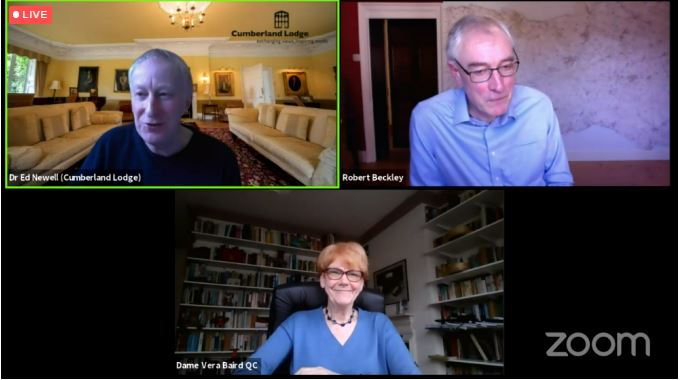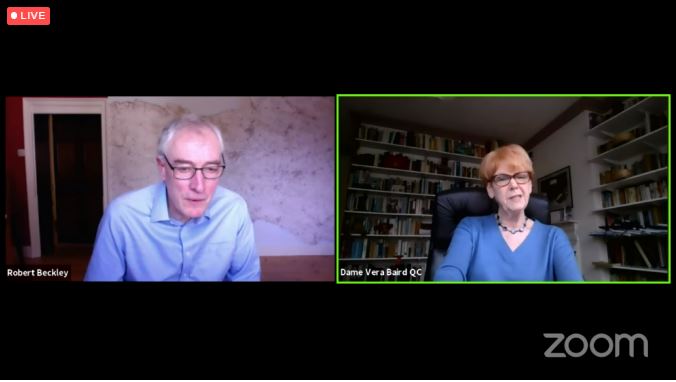On Wednesday 25 February 2021, Cumberland Lodge hosted the last of three webinars in the lead-up to the 2021 Cumberland Lodge Police Conference, Towards Justice: Law Enforcement & Reconciliation.
This webinar examined the role of the victim in investigations of past harms and injustices, with a strong focus on how the voices, or silence, of victims should be acknowledged. It took the format of a conversation between:
- Dame Vera Baird QC, Victims’ Commissioner, for England and Wales
- Assistant Commissioner Robert Beckley QPM, Overall Command of ‘Operation Resolve’, the criminal investigation into the deaths of 96 people at the Hillsborough Stadium in Sheffield, England, on 15 April 1989.
Defining ‘victimisation’
Robert Beckley began the conversation by asking Dame Vera to reflect on what constitutes a ‘victim’ in relation to her role as Victims’ Commissioner. As Professor Martina Feilzer outlined in the webinar briefing document, the concepts of ‘victims’ and ‘victimisation’ are complex to define and warrant careful and sensitive reflection. Failure to do so can result in further harm being done.
There are, for instance, ‘direct’ and ‘indirect’ forms of victimisation, inclusive of those who are directly harmed or injured and those who are impacted as a result, including the families and friends of direct victims.
Dame Vera described a ‘victim’ as someone who is affected by a criminal offence or anti-social behaviour – whether or not a charge has been pressed or anyone has been convicted.
This led to a discussion about the importance of recognising victims’ ‘rights and entitlements’ in isolation from the criminal justice system. Dame Vera advocated the need to meet victims’ needs before they enter any judicial proceedings.
For example, to help prevent ‘revictimisation’, victims must be kept informed about the processes they might be asked to be a part of, within the criminal justice system. Furthermore, she discussed the importance of collaboration between victims’ groups and police agencies to ensure that effective referral procedures are upheld.
‘Justice delayed is a justice denied’
Two aspects of Robert and Dame Vera’s discussion really struck me. Since my own PhD research concerns community conflict resolution practises in Northern Ireland, the first ensuing discussion was about the longevity of victimisation. This was initially raised by Robert, who spoke about how victims’ experiences can sometimes be worsened by restorative justice processes.
Reflecting on his experiences of the Hillsborough investigation, Robert spoke about how people’s efforts to ‘fight so hard’ to ‘challenge the system’ and ‘get their voices heard’ have sometimes led to ‘deeper traumas’ and a ‘deeper cynicism about public bodies’.
Connected to this was the problematic nature of trying to define victims’ needs in relation to whether or not the crime committed was historic or recent. As Robert highlighted, it is not always ‘historic’ from the perspective of the person who has been harmed.
Dame Vera stressed that addressing victims’ needs should not be confined to a ‘black and white’ way of thinking about crime and punishment, given that those who have recently been victimised often report that their engagement with the criminal justice system has actually made things worse. At the same time, there are historic events where victims’ needs have long been denied and an injustice continues to ‘fester’. To this end, there cannot be a ‘finite limit’ on the period within which prosecution needs to occur.
Above all, however, Dame Vera later re-iterated that the criminal justice system must look to:
‘deliver fairness and justice as quickly as possible… …as justice delayed is a justice denied’.
Social injustice
A second consideration was the long-term effects of social injustice. Robert drew attention to the recent Blood Products Inquiry as a critical reminder of how victims often go on to experience further harm in social and health-related ways. This inquiry was set up to examine the circumstances in which patients received infected blood or blood products from the NHS, throughout the 1970s and 1980s. A primary focus has been on addressing the way in which victims and their families continue to be affected, with due attention to how the authorities (including the Government) have responded.
This led to a broader discussion about the roles of victims and their families within criminal justice investigations into historic crimes. In the case of Hillsborough, Robert highlighted the importance of involving the families of those who died. But he also noted that this process was not without its limits. As he went on to reflect, there can be a tendency to ‘keep victims at arm’s length’ in large inquiries, resulting in a failure to involve victims and their families in the most ‘engaging way possible’.
Concluding thoughts
Although ‘justice delayed is a justice denied’, my overarching sense of both issues was that addressing victims’ needs must begin with the primary act of recognising past harm – no matter how recent or historic. Furthermore, as previous webinars in this Towards Justice series and Professor Feilzer’s briefing documents have highlighted, different victims and their families require different outcomes and support mechanisms.
I was also left thinking about how approaches within the criminal justice system often overlook victims’ needs. As the discussion drew to a close, Dame Vera spoke about the importance of addressing victims’ needs according to the support systems they require rather than the ‘category’ of crime committed. Robert also re-iterated that it is not the category of crime but the harm that victims experience that should be of primary importance.
Recognising the importance of assessing victims according to their needs, rather than imposing uniform treatment within the criminal justice system, seems particularly critical for future discussions.



